- From Faith Current: “The Sacred Ordinary: St. Peter’s Church Hall” - May 1, 2023
- A brief (?) hiatus - April 22, 2023
- Something Happened - March 6, 2023
Starting in the mid-50s, television has fundamentally shifted the balance of power in the US. Other people would have to talk about other countries, but here all power now resides in the hands of celebrities. The impacts of this shift on our culture are practically incalculable. In politics for example, it began with JFK; the famous factoid is that people who listened to the Kennedy-Nixon debates thought Nixon had won, whereas people who watched them were strongly for Kennedy.
The story of the 60s, 70s and 80s was an unprecedented mixing of celebrity with traditional sources of power. Whether it’s John and Yoko’s “Peace Campaign” or John Lindsay being movie-star handsome, or Marlon Brando’s refusing his Oscar to bring attention to the plight of the American Indian, or Kissinger dating Cher, or Sonny Bono entering politics…or Jerry Brown being featured in the pages of Rolling Stone…or Arnold Schwarzenegger being elected governor of the fifth-biggest economy in the world…By the time Bill Clinton played saxophone on “Arsenio,” politician, celebrity, there is no longer any difference.
More recently, celebrity privileges have been extended to the ultra-wealthy. Homely, insipid, frequently weird, they are nevertheless covered like movie stars. Today people like Elon Musk or Jeff Bezos or Richard Branson, having accumulated all the money in the world, relentlessly insert themselves into entertainment via high-profile tweets or stunts. Donald Trump, a failed tycoon prior to The Apprentice, is the latest example of this leveraging of celebrity into traditional power (financial power, political power, even military power), and using conventional power to create more celebrity.
Since we are being ruled by celebs, it’s ever-more important for regular people to know how celebrities interact with the press. When the Beatles emerged, the mainstream print press was generally adversarial towards celebrities. They enforced strict class boundaries between celebrities (showbiz types, actors, musicians), rich people (confined to the society pages) and politicians. These boundaries had existed since the penny presses emerged, perhaps a hundred years, and while they were weaker in the U.S. than in Europe, they existed everywhere. Politicians were famous, but it was a rare one that had any kind of cult of personality in the modern sense; and those who possessed rabid fanbases (like Chaplin for example) paid heavy prices for entering the political arena.
TV changed everything. Constant, uncritical, and in your very living room, it took all these people and treated them like they were the same thing (George Trow’s In the Context of No Context is great on such stuff). Celebrities became political, and politicians became celebrities.
Someone else would have to talk about books and newspapers, but in magazines the effects were vast. After 1970, celebrities became the single most powerful driver of newsstand sales. This changed the business. Not only did this simple equation—celebrities = higher sales—create magazines like People (founded 1974), it also profoundly changed the power dynamic between editors/writers and the celebrities they covered. In 1970, Harold Hayes’ Esquire could publish a racistly titled, unfriendly profile of John and Yoko without any measurable backlash; ten years later, a much gentler piece called “John Lennon, Where Are You?” caused genuine anger after Lennon’s assassination. Journalists began relying on celebrity access to have any kind of career, which meant two things:
1) they had to provide favorable coverage in order to make a living; and
2) the PR people for famous people became vastly more powerful, being able to leverage the extra money their clients would make the magazine. This allowed the flacks to counteract almost any level of bad publicity or a bad public image.
Contrary to conventional wisdom, the American press is not particularly hard on celebrities; literally no one I know reads tabloids, and I haven’t bought one since 1995. They take a lot of pictures, but in the vast majority of dealings with the press, celebrities have the upper hand. Fans want to believe GOOD things. GOOD things are where the money is, for everybody. Then, after the celebrity is dead (Michael Jackson’s a perfect example), the “allegations” come out. In this way, the media gets to retain some vestige of credibility and even-handedness, and also make a bunch more money on the back-end.
This is how people we now know to be psychopaths—people like O.J. Simpson, Harvey Weinstein, Bill Cosby—were able to live in the public eye quite happily for many decades. This is how people like Michael Jackson get away with…really anything they want.
People like Simpson are only notable when they finally do something that can’t be ignored—something visual, something extraordinarily outrageous—in his case, a murder worthy of the Grand Guignol. Bill Cosby was merrily drugging actresses for decades, and lots of people knew he was doing it. Phil Spector’s murder of a woman in his mansion surprised no one who’d heard his tales of gunplay, or read earlier books written by his wife or kids. Harvey Weinstein’s use of the casting couch is, like Simpson, notable only in that he finally did it so appallingly, he paid a penalty.
So what does this mean for you, a devoted fan of The Beatles? That’s for you to decide. To me, it means keeping in mind the vast and relentless pressures everyone has to play along. It means to disabuse yourself of the notion that “bloodsuckers just want to get rich” by lying about or stealing from celebrities, or that there’s a vast nefarious industry of anti-celebrity muckraking. People made more money in its first year than Confidential ever did. Dirty laundry simply doesn’t pay very well, and The Lives of John Lennon is a perfect example. And on the internet, where anything supposedly goes, Hulk Hogan and Peter Thiel shut down Gawker with very little effort. Hulk Hogan’s outrage over his reputation being sullied by a sex tape—remember, this was a pro wrestler—was enough to net him $31 million. Who’s getting rich here?
Our society is obsessed with gatekeepers and “the real story,” and the days where Esquire could hire an ex-covert operator for the CIA like Charles McCarry to pen that lousy 1970 profile of Yoko Ono are gone. But blind spots remain, and they’re harder to root out because they’re held by fans.
Slowly, slowly, our culture is beginning to “believe the victim” in cases of sexual assault, because we’re slowly, slowly beginning to see how patriarchy tips the tables in favor of the (often male) perpetrator. But we don’t just live in a patriarchy; we also live under capitalism, and so the rich and powerful—people who make a lot of money for other people—have a similar advantage against their accusers. Not least because we want to like them. Want them to like us. Want them to be our friends. This need may yet kill American democracy.
So I’m saying: believe assistants. Believe accusers. Be suspicious of narratives revolving around “bloodsuckers” and “haters.” Beware of stories where people in notoriously tough, toughening businesses like movies or music are softhearted or menschy or “friends of the little guy.” Sometimes they are, and it’s delightful when they are—there are some great John Lennon stories along this line. But often they are not. They cannot be. If you’d been pestered by strangers for decades, would you default to “nice”? What if one out of every hundred fans had been pushy, entitled, crazy, dangerous?
Celebrity may be the only authority we recognize anymore, but the good news is, celebrity comes from us. We should not give that power lightly, and celebrities need to earn, and re-earn, our trust. We have a country with a political system designed to use politicians’ lust for power against them; but now celebrities are politicians and politicians celebrities, and that’s broken the mechanism. Unless we wish to be ruled by a cabal of trillionaires and their idiot children, our only way out is to start looking at celebrities with a jaundiced eye.

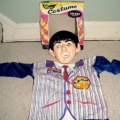

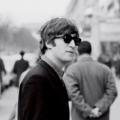



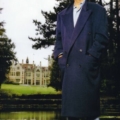
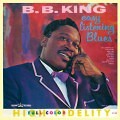

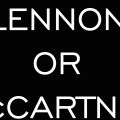
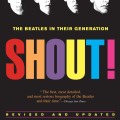
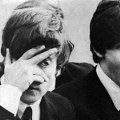
An amazing article about the Beatles. I learned a lot about their music.
But seriously, have you run out of ideas to discuss? What is the point of this blog anymore?
I wonder this all the time! 🙂
I just realized you responded.
I did come off a little too snarky. Sorry for that, and thanks for the thoughtful reply. It just feels sometimes that every blog, podcast, and YouTube channel about the Beatles spends too much time ruminating on backstage dramas, baseless conjecture, pop psychology, and tenuously related sociopolitical issues. But I suppose that’s just a personal preference. I also suppose it’s all too easy to lob criticisms like that from the sidelines.
As for the article, maybe I’m misunderstanding what you meant by the press being “adversarial” toward celebrities. From the early days of popular media, celebrities and celebrity culture were idealized in print and radio (as long as they didn’t get political). Even in the Beatles’ early years the press were happy to ignore all the orgies and debauchery because the “loveable moptop” image sold better.
@DeJunko,
No offense taken — and I happen to share your fatigue with the endless amount of Beatles-as-second-hand-soap-opera. Not just “soap opera” — the story as told in conventional sources is dramatic enough, if you really engage with it, and learn the context — but in the “I’m bored, so let’s read between the lines” way that seems to be getting more common.
To some degree I think this is simply a result of continuing fan interest, but no new material to engage with. What can a post-2000 Beatle fan talk about? If you talk to an original fan, they’ll speak mostly about their own experience of the Beatles as it all happened. Myself, as a second-generation fan, I’ll talk about my pursuit of bootlegs and so forth. But fans born after Anthology find themselves working with a somewhat inert text; that’s why I try to be indulgent when they dig into John and Paul’s emotional lives as they perceive them through once-rare video clips…even if it’s not my cup of tea.
But there is always the larger history, and it is so very rich. I once heard a podcast where the beginning of Beatlemania was juxtaposed with the Profumo Affair, and found it gripping. People living then would’ve experienced them like that, simultaneously, and so the juxtaposition had some deep truthfulness. The Beatles as a gateway to the history of the 60s and 70s, that’s a very very good thing. That right there made me the person I am today.
As to the relationship between the press and celebrity, I think it’s very very complex. In general, anything entertainment-related had a somewhat volatile relationship with the professional press. The Beatles signal the shift from a fundamentally adversarial — or perhaps “cynical” is a better word — press stance towards things aimed at teenagers, to a cheerleading one. Yes, corporate-backed stars got favorable coverage, but if/when they were got on the outs with their “owners” — the studios, for example — they were often ruined for sport (Marilyn Monroe could make a case here). Protection was a function of being inside the system of agents/managers/corporations, not owed to them because they were important or valid artists.
In the coverage of the Beatles’ 1964 trip to America, you can perceive scorn in the way the professional journalists interact with them; they were thought to be utterly unimportant, equivalent to a flea circus. (This dynamic could be glimpsed at the party at the British Embassy, too.) While this scorn continued to some degree through every US tour, eventually the commercial FACT of them couldn’t be ignored, and there is a grudging respect for that at least. But even so, if you watch footage of their final tour the “Jesus” controversy is manufactured out of press scorn, and even when covering their 1966 concert at Shea much is made about how they seem to be “fading.” There is a persistent desire on the part of the (mostly male, mostly older) news media to put these longhaired femme-y foreigners in their place, and cast The Beatles as a weird fad, a trifle, a flash in the pan, yesterday’s news…even when it’s clear they aren’t.
This scorn was unimaginable just ten years later, because the culture had changed — the counterculture was now the mainstream, it was numerically huge and economically vast, and (most importantly) had its own press organs. What NBC thought of Ziggy Stardust didn’t matter nearly as much as what Rolling Stone or NME did. And while that change is on the whole good, it had led to a press that is completely supine in the face of celebrity.
But seriously, @dejunko, if you’ve been following the comments over the last six months, it’s become pretty clear that there are many readers of Hey Dullblog that have a fairly naive attitude towards celebrity; they believe that the information we learn about celebrities is basically the truth. It is not; what we are told, and what we are not told, is all deeply commercial. Many fortunes have been built on the backs of The Beatles, and not just John/Paul/George/Ringo’s. Even today, the “show” is going on. Before you can figure out what might be true and what might be false, or whether this image manufacture is good/bad/neutral, you have to be alerted to its existence.
Rather than addressing that deep within a comment thread, I decided to surface it as a post in hopes of stimulating a bit of discussion about it.
John Lennon was hyper-aware of these issues, and talked about them at length. He was, frankly, obsessed with them after 1968, and most of his non-musical public actions have a relationship to his celebrity. He is without doubt one of the most important creators of modern celebrity, and his death (along with George’s near-death) is a very good example of the high-wire act that modern celebrity requires. Lennon was deeply aware of the rise of celebrity as religion (hence his Jesus comment), and was one of a handful of celebrities who purposely moved into politics. He also fed the public a vision of his “personal life” to increase his power and influence, but was deeply resentful of any public criticism that resulted. I think he would’ve really disliked the internet for that reason.
George played in these waters a bit, much less than John; Paul and Ringo really not at all. Paul and Ringo have the same basic relationship to the public as any movie star from the 1950s. Not only has this old fashioned tack worked for them, in that they’ve managed to live and create without threats to themselves or their families, it also makes their public statements a lot less tricky to decode. When Paul says he loved Linda, that’s borne out by all the available data we have; it’s a fairly neutral fact. When John says that he and Yoko are a love affair for the ages, that’s a much bigger claim that doesn’t gibe with all our information. And so we have to say, “Did he believe this? Did he believe it at the moment? Did he not believe it but wanted to create an image in the fans’ minds? Why did he say that? Why didn’t he just say some typical celebrity answer, ‘I love my wife; we’re very happy’?”
That’s what makes John Lennon so fascinating, but also so maddening.
When Paul says he’s a vegetarian, we hear that and ponder vegetarianism, because Paul seems to mean it, isn’t a nut about it, and seems in good health. That belief, while slightly out of the rockstar mainstream, generally fits with who Paul is in public. And I have never once heard a tale of Paul being a “secret meat eater.”
When John says that he’s reading a book called “You Are All Sanpaku” and starts talking about having a space between your lower eyelid and your iris as a mark of poor health, and he and Yoko eat macrobiotically but still smoke because they ‘don’t believe in cancer'” and he looks super-thin and talks like someone who has an eating disorder, this is very weird, interesting stuff that seems to be a window into Lennon and his wife…but then we read about him binging on junk food, and Yoko possibly still being hooked on heroin, and maybe John too, and suddenly John’s statements about diet call a bunch of questions: what’s up here? Is he just lying? Does it matter? How can we tell? And if he was lying, why didn’t anybody say anything then, and why did information to the contrary get attacked so vigorously? Why did/does anyone give a shit what John Lennon ate or didn’t eat? Was or is he some sort of religious figure? Are there any limits to celebrity power to influence their fans?
All this, though it may seem beside the point, is fairly central to the story of The Beatles, and their role in society in the Sixties and today.
Super bummed to read such a snarky and rude response to a thoughtful post on someone’s *free* blog. The people who run this clearly adore the Bestles and also extend the conversation, as previously started, to topics that are related to broader & deeper social & cultural issues. If you don’t like that, fine, it looks like they appreciate dialogue, but why so mean? Would you say something like this in person? Why do you think the author owes you anything? Why be this way when the world is hard enough?
ahem, “Beatles,” please blame my fat thumbs and irritation! I’ll go back to lurking now. 🙂
Bestles works for me. Similar to Beats All. 🙂
Well said, Michael. There is a debate going on in Britain right now regarding Megan Markle’s latest appeal win over the press, that is, the balancing act between freedom of expression versus the rights of celebrities to keep their reputations untarnished.
I think many of us have a jaundiced view of celebs. But the brick wall presents itself when any valid criticism, however mild, gets shot down in flames with accusations of hating, jealousy, racism, sexism, any ism.
Hating or nitpicking for the sake of it is different of course. Somebody doesn’t like a face, doesn’t like a song/film/book (which we are allowed to anyway), thinks the person is a dick, or just plain dislikes them, whatever. The internet is awash with this idiocy. It’s picking out what is valid, or at least has some semblance of truth.
Entrenched fan worship, not only with the Beatles, is ubiquitous so I can’t see this changing anytime soon.
Meghan Markle, another woman who seems to be hated for exisiting and daring to have an opinion, who gets subtly and not so subtly racist coverage by the press, who is blamed for “breaking up the band” even though her husband was already fed up and looking for an out.
Kia ora Mike! Thank you for your thoughtful post – there is little I want to add the substance of your insights, but I did want to express my gratitude for the great work you and the other members of Hey Dullblog do here. While I have loved The Beatles from a young age, I only really got into learning more about them and their “story” at the beginning of last year. What I have really appreciated from discovering both Hey Dullblog and Erin Torkelson Weber’s work on The Beatles is that they both demonstrate that the Beatles are really a good case study from which to examine numerous and intersecting facets of contemporary U.S. and U.K. soft power, politics, history, issues of racism and sexism, culture (the list goes on) … And, to tie it back to your post, how all of this relates to the advent of celebrity culture and how those in power craft and/or maintain certain narratives. I will always love the Beatles’s music, but I am really glad that I discovered these tertiary sources, which have emphasized the importance of engaging with the Beatles’ narrative(s) critically, from all the angles it intersects. It definitely appeals to my humanities-graduate sensitivities 🙂
Understanding the “politics” of the Beatles doesn’t remove my love for their music or my admiration for their craft, but it does help me keep them firmly on the ground, in the world and context around us. Because, if nothing else, in a world full of inhumanity, their music always reminds me of some of the joys of being human.
In hindsight, I realise that the last couple of sentences are cheesy and cliché, and the general vibe of my whole comment could fit pretty solidly in the pretentious category 🙂
All I really wanted to say was that Hey Dullblog’s posts and discussions always make me think and reflect, and that is greatly appreciated!
“What I have really appreciated from discovering both Hey Dullblog and Erin Torkelson Weber’s work on The Beatles is that they both demonstrate that the Beatles are really a good case study from which to examine numerous and intersecting facets of contemporary U.S. and U.K. soft power, politics, history, issues of racism and sexism, culture (the list goes on) ”
Amen! You sum up my thoughts better than I could have myself.
Hey Dullblog is so great for this kind of deep analysis. And it’s not pretentious to think along these lines; the Beatles were, after all, the biggest popular culture phenomenon of the 20th century – of course there’s a lot of deep cultural stuff we can learn from their story.